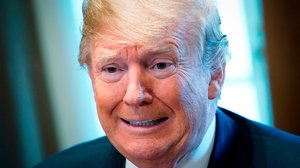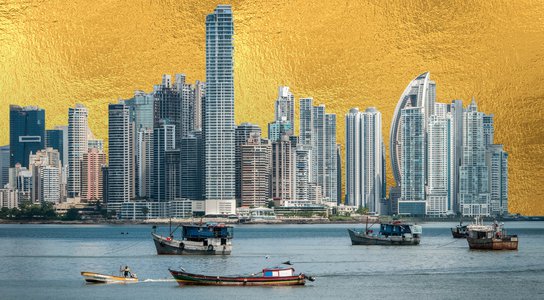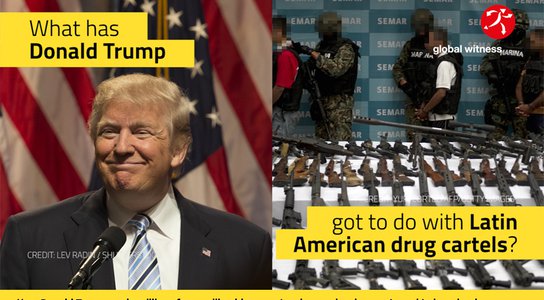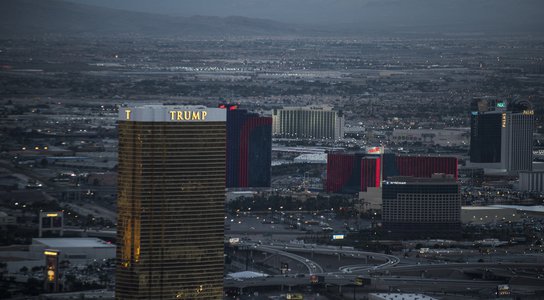Who’s one of the top clients at Trump’s resorts? The President himself. And, it’s costing US taxpayers millions of dollars.
Since late 2015, Republican entities, the Trump campaign, and various government agencies have spent at least $16.1 million at Trump-managed and branded hotels, golf courses, and restaurants, according to ProPublica.
Trump has spent nearly a third of his time in office at a property owned, managed or branded by the Trump Organization – even directing missile strikes from and meeting heads of state at his Mar-a-Lago resort in Palm Beach, Florida.

Credit: Mandel Ngan / Getty
In all, he’s spent at least 155 days visiting at least one of these resorts, golf clubs or properties, and these numbers keep rising. His golf trips alone have cost US taxpayers at least $69 million, including Air Force One flights and security costs.
As the President prepares for his trip to the United Kingdom, it’s no surprise that his final stop will be at his luxury golf resort in Scotland – Turnberry– a brand new property opened in 2017 by his son Eric.
New receipts and other documents obtained by Property of The People show that US government agencies have spent $344,008.28 of taxpayer funds at Trump properties from January 15, 2017 until now. And, of that amount, according to the Scotsman, more than £10,000 (roughly more than $13,000) of it was spent by the US Department of State on security and other measures for Eric’s trips to Scotland to develop and open the Turnberry property.
Apart from the obvious fact that Trump is making money off of taxpayers, he is benefiting in a way unlike any other president before him. Especially as he’s retained his position as the ultimate beneficiary and functional owner of his business, despite commitments to distance himself from the Trump family business during his campaign and presidency.
And the money he’s made hasn’t always originated from a clean source. Our investigation of money laundering at the Trump Ocean Club in Panama showed that Trump benefited from the laundering of drug money as he made a cut from all unit sales, while apparently turning a blind eye to the source of buyers’ funds and the background of some of the individual brokers. One owner of such units was Colombian fraudster David Murcia Guzmán, who was recently released from U.S. federal prison after serving a sentence of nine years for laundering millions of dollars' worth of illicit funds, including narcotics proceeds, through secret companies and real estate.
Meanwhile in India, Trump’s business deals worth an estimated $1.5 billion also allegedly bear signs of suspected money laundering and fraud associated with some of Trump’s partners there.
The New Yorker has reported that in 2012 the Trump Organization signed a licensing deal to develop a Trump-branded hotel in Azerbaijan. The developer, a company headed by the son of the then-Transportation Minister had close ties to the Darvishi family, some members of which headed firms reportedly controlled by the Iranian Revolutionary Guard.
When Trump cozies up to foreign leaders at his own resorts or visits them on official state business while followed by swarms of local and foreign press – or decides which countries to keep off of immigration ban lists – how can we be sure that he’s not influenced by whether a lucrative business deal for his organization could be in the mix?
As Trump gears up to visit the UK, it’s clearly not just this trip and his scheduled visit to Turnberry that Americans should be concerned about. No matter the size of the payments from the US government to Trump properties, this trip cements additional tiles in a growing mosaic that will one-day show how much Mr. Trump, the businessman, benefited from holding the office of US president, with taxpayer money ending up in his pockets.
What’s worse, there seems to be little attempt by the Administration to justify Trump’s financial benefit from taxpayer dollars – a systematic problem that we shouldn’t expect to end any time soon.
However, Congress and other branches of the federal government can act. For example, lawsuits that seek to establish whether the types of activities described here may be a violation of the Constitution’s Emoluments clauses – which prohibit the President from receiving any emoluments (gifts or payments) from foreign governments, or from the federal government or the states – are winding their way through federal court.
Members of Congress have also recently introduced the HOTEL Act, which if passed would ban executive branch employees from staying at any property owned by the President, Vice President, Cabinet secretaries or their family members.
Whoever holds the office of the President, the American people need to be sure that the business the President conducts while in office is the people’s business, and not a deal on the side.


